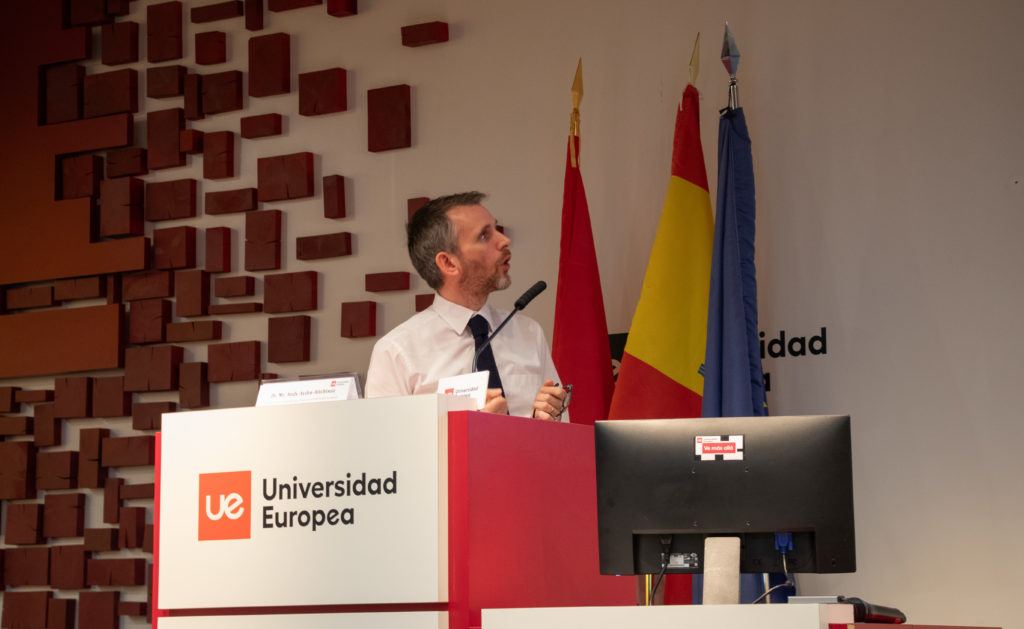Elmira Loffredo, Paula Rodriguez y Shayndell Roncal
Wednesday 20th of March in the Universidad Europea de Madrid, the IV Criminology Congress was celebrated. With the special visit of the Senior Lecturer in Criminology Prof. Dr. Mr. Andy Aydın-Aitchison, in the auditorium of the B tower. With the presence of Criminology and International Relations students among other degrees and guests.
Dr. Andy Aydın-Aitchison is currently working on the criminology of atrocity crimes with an empirical focus on the former Yugoslavia and the analysis of evidence presented in international criminal courts. At the beginning of his presentation, he introduces his research paper on Victims, Perpetrators, and Bystanders: Atrocity and its Aftermath in the Films of Jasmila Žbanić, gives a brief introduction to 1992-95 war in Bosnia, and went deeper on post-war bosnian cinema and Žbanić’s contributions as he comments on the analysis and findings regarding the bosnian director’s films.
He explains that his work with films is “a new adventure”. Using the term “cinematic criminology” he goes into the research of how films communicate criminology knowledge, in a way that it can even transform it. Throughout the years academic criminology has tried to correct popular criminology, however Aydın-Aitchison believes that popular criminology can be used to help cover blind spots for academic criminology.
The speaker presents the work of the director Jasmila Žbanić with the visual support of a picture of her looking directly at the camera. With this he explains that during her films there are various moments in which the characters look at the camera, breaking the fourth wall. With this he is able to represent what he says to be one of the key problems of society when dealing with atrocities, looking away. He believes that paying attention to the wars in the right way, at the right time is really important, mostly during the pre-atrocity phase. Nowadays the media pays attention to it in ways that just amplifies the problem in a way that could be described as “feeding the bully”. As a society we need to pay preventative attention, looking at the right time and not only during the aftermath.
He presents the filmography of Jasmila Žbanić focusing on four main movies: Grbavica (2006), On The Path (2010), For Those Who Can Tell No Tales (2013), Quo Vadis, Aida? (2020). From these he explains the plot from a criminology and victimology point of view. He is able to bring out the academic engagement with the films, with the attention it pays to the ongoing presence of the horrors of the war, the daily life after the war and raising awareness in contexts of denial. He also explains the topics touched in the movies such as the micro stories of the victims in the different contexts.
Furthermore, Mr. Aydın-Aitchison has also spoken about how the movies in the 1980’s in places such as Hollywood have boosted the creation of prejudices about europeans in the international conflicts. First of all, he explained that cinema shapes the minds of the spectators because of the impact it causes. He used as an example how in the 80s a lot of times the bad guy had a north-east european accent.

When talking about cinematic victimology of atrocity, professor Aydin-Aitchison explained how, in her movies, Ms. Žbanić makes emphasis on the victims in order to make the audience feel related or identified to the problems the characters faced throughout the film, “she is most interested in victims” highlights Dr. Andy. On the other hand, Žbanić being characterized by being a feminist, avoids representing the perspective of perpetrators as she “despises the structure of those blinded by power”.
Nevertheless, Aydın-Aitchison also expressed how interesting Žbanic’s take was when she did go into the perpetrators side of the story. He gave the example of Joka, a commander of the serbian forces in the movie Quo Vadis, Aida?, who at first was represented as arrogant, aggressive, domineering, sarcastic and threatening, but is later shown as domestic and familiar. This led Prof. Dr. Mr. Andy to think that this could be seen as a contradiction on the part of the director Jasmila and a sign that she could indeed have a space for an understanding of the perpetrators side, showing that there is not only one dimension to their stories.
The Senior Lecturer in Criminology spoke about the context in which the Žbanić movies have been developed, “Sarajevo isn’t a mono ethnic city”, there was a lot of conflict and movement in the zone due to political and religious misunderstanding, this has somehow lead the population to have radical ideologies and to contemplate a “war scene”, added Aydın-Aitchison.
